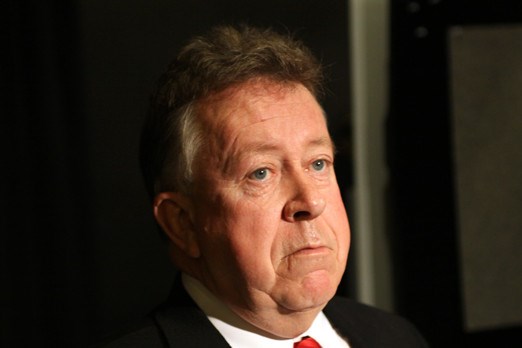Kenora Mayor Dave Canfield says smaller municipalities can’t possibly keep up with infrastructure needs and is calling on the province to move rapidly to upload some of the costs.
Canfield made the suggestion on Thursday, taking a break from his duties as vice-president of the Northwestern Ontario Municipal Association in the midst of the organization’s three-day annual general conference being staged in Thunder Bay this week.
“We probably have the worst-case scenario in my own community. We have 18 multi-million dollar bridges in a city of 15,000 to 16,000 people. Absolutely it’s impossible for us to maintain those bridges. It’s just not realistic,” Canfield said.
“I believe Thunder Bay has the most roads per capita of any community in the province of Ontario. These are just unrealistic things that happen over the years back in the late 1990s that have to be reversed.”
Canfield said if the province takes over care of the bridges, at least in Kenora’s sake, the community can take care of the roads through other available infrastructure funding.
“But we only have one taxpayer and we only have one way to get taxes, and that’s through your property taxes. And I think most municipalities in Northwestern Ontario – I know we’re hearing it in the city of Kenora – we’ve hit the wall in taxes. We can’t go any higher,” Canfield said, after listening to Infrastructure Minister Bob Chiarelli
“We’re expressing that to the government and trying to make the government understand that this is a unique situation. We don’t have the fat like they have in Toronto to burn off. We’ve done that, we’ve streamlined. We’ve done everything we can do.”
It was one of many topics that broached the floor Thursday during the NOMA conference’s first official day of meetings, attended by community leaders from communities across the region.
Of interest in particular was the province’s progress with Bill 151, the Forest Tenure Act, and the promised Northern Policy Institute.
NOMA president Ron Nelson said the interest in Bill 151 lies mostly in the changes made since it was first presented in January rather than the lack of consultations in the North this time around. Several organizations, including the Thunder Bay Chamber of Commerce, expressed outrage last month when the provincial Liberals revealed meetings would be held solely in Toronto rather than across Ontario.
Nelson said there is much concern that changes to the Act, in particular the permanency of the local forest management corporations.
For starters they want the LFMCs limited to just two for a trial period of five years, recognize and support enhanced shareholder forest licenses and curtail the government’s ability to cancel licenses, commitments and supply agreements without need of reason and with no legal recourse built in for the private sector.
“Now that it’s gone back to the government to look at, there have been some changes in that Act and there are things that need to be redone to get it back to the way it was in January. That’s what these amendments are. We’re just trying to make sure these amendments follow what we asked for and we are being heard,” Nelson said.
He’s confident the province will at least listen to what they have to say, if not act.
Gravelle said NOMA’s input is always welcome and in particular will go a long way to helping shape the vision of the Northern Policy Institute, along with a number of other organizations.
“The important thing is to make sure this policy institute is put together in a fashion that it can contribute to some solid advice for now and into the future,” Gravelle said.
The meetings continue on Friday, with a mining development panel, a Growth Plan update and a minister’s forum featuring Gravelle, Ministry of Natural Resources Linda Jeffrey and John Milloy, the m minister of training, colleges and university among the Day 3 highlights.
Sign in or register
- Messages
- Post a Listing
- Your Listings
- Your Profile
- Your Subscriptions
- Your Likes
- Your Business
- Support Local News
- Payment History
Registered Users
Already have an account?
New Users
Create a free account.
